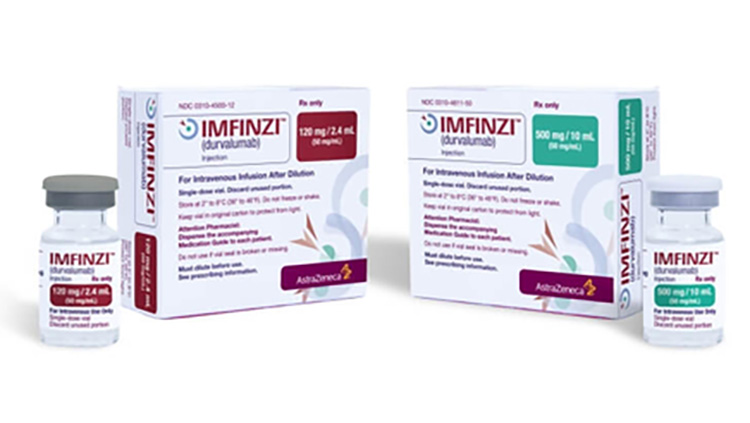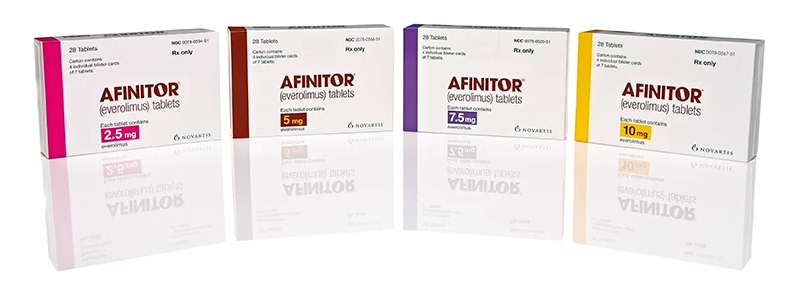Imfinzi (durvalumab) vs Afinitor (everolimus)
Imfinzi (durvalumab) vs Afinitor (everolimus)
Imfinzi (durvalumab) is an immune checkpoint inhibitor that works by helping the immune system to detect and attack cancer cells, and it is commonly used in the treatment of certain types of lung cancer and bladder cancer. Afinitor (everolimus), on the other hand, is a targeted therapy known as an mTOR inhibitor, which is used to treat various types of cancer such as advanced renal cell carcinoma, certain breast cancers, and neuroendocrine tumors. The choice between Imfinzi and Afinitor would depend on the specific type of cancer being treated, its stage, the patient's overall health, and the treatment protocol recommended by the oncologist, as they have different mechanisms of action and are approved for different indications.
Difference between Imfinzi and Afinitor
| Metric | Imfinzi (durvalumab) | Afinitor (everolimus) |
|---|---|---|
| Generic name | Durvalumab | Everolimus |
| Indications | Urothelial carcinoma, non-small cell lung cancer, extensive-stage small cell lung cancer | Advanced hormone receptor-positive, HER2-negative breast cancer, advanced neuroendocrine tumors, advanced renal cell carcinoma, renal angiomyolipoma with tuberous sclerosis complex, subependymal giant cell astrocytoma with tuberous sclerosis complex |
| Mechanism of action | Programmed death-ligand 1 (PD-L1) blocking antibody | mTOR inhibitor |
| Brand names | Imfinzi | Afinitor, Afinitor Disperz |
| Administrative route | Intravenous infusion | Oral |
| Side effects | Fatigue, musculoskeletal pain, constipation, decreased appetite, nausea, peripheral edema, urinary tract infection, pneumonia, dyspnea, rash, cough, etc. | Stomatitis, infections, rash, fatigue, diarrhea, edema, abdominal pain, nausea, fever, asthenia, cough, headache, etc. |
| Contraindications | None known | None known |
| Drug class | Immune checkpoint inhibitor, monoclonal antibody | mTOR inhibitor, immunosuppressant |
| Manufacturer | AstraZeneca | Novartis |
Efficacy
Imfinzi (Durvalumab) in Lung Cancer Treatment
Imfinzi (durvalumab) is a monoclonal antibody that is part of a class of cancer treatments known as immune checkpoint inhibitors. Specifically, durvalumab targets the programmed death-ligand 1 (PD-L1), which is a protein that can be overexpressed in various types of cancer cells, including lung cancer. By binding to PD-L1, durvalumab prevents it from interacting with PD-1 receptors on T cells, which can result in the activation of the immune system to attack cancer cells. The efficacy of Imfinzi has been demonstrated in several clinical trials, particularly in patients with locally advanced, unresectable non-small cell lung cancer (NSCLC) following chemoradiation therapy. In this setting, durvalumab has been shown to significantly improve progression-free survival and overall survival when compared to placebo.
Afinitor (Everolimus) in Lung Cancer Treatment
Afinitor (everolimus) is an mTOR inhibitor that has been used in various cancer treatments. The mTOR pathway is an important regulator of cell growth, proliferation, and survival, and its dysregulation is implicated in the pathogenesis of several cancers, including lung cancer. Everolimus works by inhibiting the mTOR pathway, which can lead to reduced cancer cell proliferation and increased apoptosis. While Afinitor has been approved for use in certain types of cancers, its efficacy in lung cancer is more limited. In clinical studies, everolimus has shown some benefit in patients with advanced NSCLC, particularly in those who have progressed after prior treatments. However, the overall impact on survival in lung cancer patients is modest, and it is not a first-line treatment option for NSCLC.
Combination Therapies and Lung Cancer
Recent advances in lung cancer treatment have focused on the potential benefits of combination therapies. Combining drugs like durvalumab and everolimus with other treatments, such as chemotherapy, targeted therapy, or radiation, may enhance their efficacy. Clinical trials are ongoing to investigate the best combinations and sequences of treatments that include drugs like Imfinzi and Afinitor. While the combination of durvalumab and everolimus is not a standard treatment for lung cancer, research into such combinations is part of the effort to improve outcomes for patients with this disease.
Conclusion
In conclusion, both Imfinzi (durvalumab) and Afinitor (everolimus) have shown efficacy in the treatment of lung cancer, albeit in different contexts and with varying degrees of success. Durvalumab has a more established role in the management of certain types of NSCLC, particularly after chemoradiation therapy, while everolimus may be used in specific cases of advanced NSCLC following progression on other treatments. Ongoing research, including clinical trials, continues to explore the full potential of these drugs, either alone or in combination with other therapies, to improve patient outcomes in lung cancer.
Regulatory Agency Approvals
Imfinzi
-
European Medical Agency (EMA), European Union

-
Food and Drug Administration (FDA), USA

-
Health Canada

-
Therapeutic Goods Administration (TGA), Australia

-
Medsafe (NZ)

Afinitor
-
European Medical Agency (EMA), European Union

-
Food and Drug Administration (FDA), USA

-
Health Canada

-
Pharmaceuticals and Medical Devices Agency (PMDA), Japan

-
Therapeutic Goods Administration (TGA), Australia

Access Imfinzi or Afinitor today
If Imfinzi or Afinitor are not approved or available in your country (e.g. due to supply issues), you can access them via Everyone.org.
How it works

Make an enquiry
Choose the medicine you want to buy, answer a couple of questions, and upload your prescription to speed things up. We’ll get back to you within 24 hours.


Make an enquiry
Choose the medicine you want to buy, answer a couple of questions, and upload your prescription to speed things up. We’ll get back to you within 24 hours.


Breeze through the paperwork
We'll guide you through the required documents for importing unapproved medicine, ensuring you have all the necessary information.


Get a personalized quote
We’ll prepare a quote for you, including medicine costs and any shipping, administrative, or import fees that may apply.


Receive your medicine
Accept the quote and we’ll handle the rest - sourcing and safely delivering your medicine.

Some text on this page has been automatically generated. Speak to your physician before you start a new treatment or medication.
Let's talk
If you have any questions, call us or send us a message through WhatsApp or email:
Contact us




